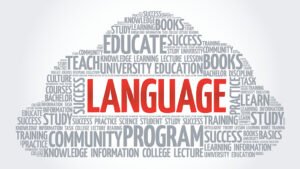Education and Economic Importance of Language. Language is a fundamental element of human civilization, serving as a primary medium for communication, cultural expression, and intellectual development. Its significance extends beyond daily interactions to profoundly influence education and the economy. This article explores the dual impact of language on educational outcomes and economic growth, illustrating how proficiency in language shapes both individual opportunities and broader economic trends.
Education and Economic Importance of Language
Language and Education
1. Foundation of Learning
Language is the cornerstone of the educational process. It is through language that we acquire knowledge, articulate ideas, and engage with academic content. For students, language skills are essential for reading comprehension, writing proficiency, and critical thinking. Early language development is crucial for cognitive growth and sets the stage for future academic success.
In early education, children who develop strong language skills tend to excel in other areas of learning. Vocabulary acquisition, grammatical understanding, and communication abilities support not only literacy but also mathematical and scientific reasoning. As students progress through their educational journey, language proficiency becomes increasingly important for understanding complex concepts and expressing sophisticated ideas.
2. Access to Information
The ability to access and understand information is heavily reliant on language skills. Educational resources, including textbooks, online materials, and academic journals, are predominantly available in various languages. Proficiency in a language thus determines access to knowledge and educational opportunities. For instance, students who are fluent in English, often considered a global lingua franca, can access a wider range of academic resources and participate in international scholarly discourse.
3. Educational Equity
Language plays a critical role in educational equity. Multilingual education programs aim to bridge the gap for students from diverse linguistic backgrounds, ensuring they receive quality education in their native language while also learning a dominant language. This approach helps in mitigating educational disparities and fosters inclusivity in the classroom. Effective language education policies and practices are essential for supporting learners from different linguistic communities and promoting equitable access to educational resources.

Language and Economic Growth
1. Workforce Competency
In the global economy, language skills are a significant asset in the workforce. Multilingual employees are highly valued for their ability to engage with diverse markets and facilitate international business transactions. Companies with employees who speak multiple languages can expand their reach, negotiate effectively, and build stronger relationships with clients and partners across different regions.
Proficiency in major global languages, such as English, Spanish, Mandarin, and French, can enhance career prospects and earning potential. Professionals with advanced language skills often command higher salaries and enjoy better job security. In addition, language skills can open doors to roles in international relations, diplomacy, and global commerce.
2. Economic Development
Language contributes to economic development by fostering trade and investment. Countries with a multilingual workforce can attract foreign businesses and investors who seek local expertise and market knowledge. Effective communication in multiple languages facilitates smoother business operations, reduces cultural misunderstandings, and enhances negotiation processes.
Moreover, language plays a role in tourism, a vital economic sector for many countries. Tourism relies on the ability to communicate with visitors from around the world, and multilingual services can improve the quality of the tourist experience, leading to increased revenue and economic growth.
3. Innovation and Technology
The technology sector also benefits from language diversity. Software development, customer support, and content creation require language expertise to cater to global audiences. Multilingualism in tech companies can drive innovation by integrating diverse perspectives and understanding the needs of various linguistic groups. Additionally, language technologies such as translation software, voice recognition systems, and multilingual search engines contribute to global connectivity and efficiency.

Challenges and Opportunities
1. Language Barriers
Despite the advantages, language barriers can pose challenges to both education and economic growth. In educational settings, language barriers can hinder students’ learning experiences and limit their academic performance. In the workforce, language discrepancies can create communication difficulties, impacting productivity and collaboration.
Addressing these challenges involves implementing effective language policies, providing language training, and promoting multilingual education. By investing in language development, individuals and organizations can overcome barriers and harness the benefits of language diversity.
2. Policy and Investment
Governments and educational institutions play a crucial role in supporting language education and promoting linguistic diversity. Investments in language programs, bilingual education, and language research can enhance educational outcomes and drive economic growth. Additionally, fostering a culture of multilingualism can contribute to global understanding and cooperation.

Language is a powerful tool that shapes both educational and economic landscapes. In education, language proficiency is essential for learning, accessing information, and achieving academic success. In the economy, language skills drive workforce competency, economic development, and technological innovation. By recognizing the importance of language and investing in language education and policies, societies can unlock the full potential of their human capital and foster a more inclusive and prosperous world.
See more
